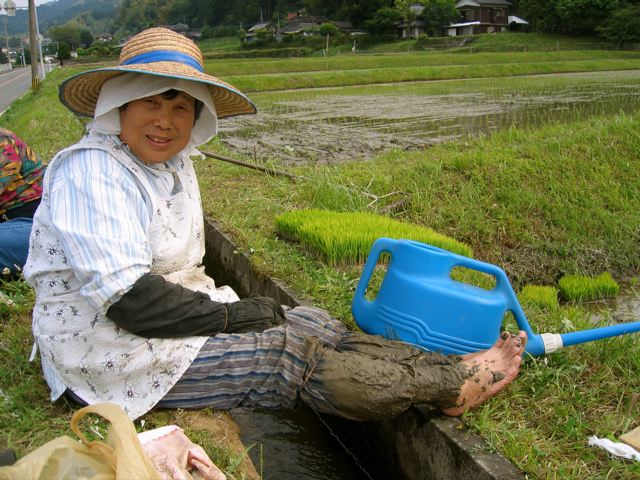Rice paddies in the higher altitudes of Kyushu have been flooded and planted with rice seedlings this month in Japan, just before the annual rainy season begins in early June. Last week while driving home from the eastern part of the island, we saw this lady taking a break from her work of planting rice seedlings by hand.
 Meet Shimeko Kajiwara, 77, of Kama City, Fukuoka Prefecture on the island of Kyushu, Japan. Asked how it felt to be barefoot and walking in knee-high mud, she said, “It feels really good.” She also said that she even sometimes runs across snakes that slither out of the clumps of grass that divide the paddies. Water flows in the irrigation ditch below her legs to fill the paddies so that the rice seedlings can take deep root to begin their four-month growth period. The ripened rice is usually harvested by the end of October.
Meet Shimeko Kajiwara, 77, of Kama City, Fukuoka Prefecture on the island of Kyushu, Japan. Asked how it felt to be barefoot and walking in knee-high mud, she said, “It feels really good.” She also said that she even sometimes runs across snakes that slither out of the clumps of grass that divide the paddies. Water flows in the irrigation ditch below her legs to fill the paddies so that the rice seedlings can take deep root to begin their four-month growth period. The ripened rice is usually harvested by the end of October.
Kajiwara-san’s work clothes are typical of farming women who work long, long hours out in the fields and paddies. It looks as though there is no matching piece, but this style of clothing protects from ultra-violet rays of sun and soaks up sweat. It may look hot to be dressed like this, but in reality it is perhaps the coolest way to be protectively dressed when doing this kind of work.
Notice a flat of rice seedlings in the center of the picture. Kajiwara-san takes a handful of these seedlings (sitting in the paddy at the right of the picture) and bending over at an almost 45 degree angle, pushes them deep into the mucky, muddy paddy with her hand. Then pulling up one foot from the mucky, muddy paddy, she takes a step and plants her foot again into the mucky, muddy paddy to continue planting the four corners of the paddy into which the planting tractor could not fit. (Today’s tongue twister: Say “mucky, muddy paddy” ten times as fast as you can.)
Kajiwara-san plants rice seedlings and will absolutely see the result of RICE in October. What do we plant in the hearts of friends, brothers, sisters, aunts, uncles and parents when we get angry? jealous? bitter? or proud? You can be sure there will be a harvest down the road of life of every word that proceeds out of the mouth. “You will have to live with the consequences of everything you say. What you say can preserve life or destroy it; so you must accept the consequences of your words.” (Prov. 18:20-21 GNB)
Wow! Let’s jog our memories: Kajiwara-san said that she even sometimes runs across snakes that slither out of the clumps of grass? (Someone who is a ‘snake in the grass’ betrays you even though you have trusted them.) Sometimes venomous words slither out of our mouths when least expected. We’ve got to be on the watch for those nasty, slippery critters. They can kill friendships with one bite! One source of information about snakes and bites says, “Even a bite from a so-called ‘harmless’ snake can cause infection or allergic reaction in some people.” Now you may know why you don’t like to be around certain people. Perhaps THEY bit you! Or, now you know why so-and-so doesn’t come around you anymore. Perhaps YOU bit them!
Lastly, John Henkel of the US Food and Drug Administration says that when bitten by a snake “doctors turn to the antidote to snake venom (antivenin, sometimes called anti-venom) as a reliable treatment for serious snakebites.” Dr. Lord Jesus Christ, however, has the best preventative medicine for snake bites available:
“Thy WORD have I hid in my heart that
I might not sin against thee.” (Psalm 119:11 KJV)
When one is filled with the Word of God, one doesn’t have to worry about biting others, or when bitten, the poison won’t have any lethal effect, but rather a forgiving one.
Let’s fill our hearts this weekend with the Word of God and be ready in case any of the mucky, muddy paddy snakes in the grass jump out at us and bite us.
